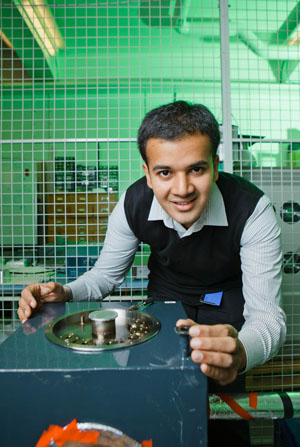Better Insulation for Durable Transformers
Master’s student brings range of skills to degree project
NEWS
Arun Venkatamaran’s degree project on insulation for electrical transformers spans a range of fields, from computer simulations and design to construction and electrical power. Collaborating with a chemistry researcher gave the project breadth and interdisciplinary appeal. “That's the future,” he says.

The opportunity to get involved in an interdisciplinary approach to science brought Venkatamaran to Sweden, Stockholm and KTH. He studied Electrical and Electronics Engineering in his home town of Chennai in southern India, where coursework covered a wide range of topics, and his aim when he applied to KTH was to complement his undergraduate education with a similarly broad graduate programme. The KTH master’s programme Systems, Control and Robotics was a perfect fit.
“Robotics contains everything I’m interested in: electric power, electronics, design and mechanics,” says Venkatamaran.
His degree project looks at increasing the voltage capacity of transformers, one of the main components of power systems and electronics. Financed by ABB Corporate Research, the project is conducted in collaboration with PhD student Rebecca Hollertz in the KTH Department of Fibre and Polymer Technology.
“I chose to do my degree project in electrical power because that was my major at the undergraduate level. That it was in collaboration with ABB was also important, because I’ve always been a student and I wanted to gain experience in industry,” he adds.
Hollertz works on developing cellulose-based materials that can be used in combination with oil to insulate transformers. She’s conducting a series of experiments to study what happens when these materials are exposed to extremely high voltage, and looking for innovations that will improve their insulating properties.
“The ultimate objective is avoiding short-circuits,” explains Venkatamaran.
“Any insulating material has a certain voltage level above which it won’t stop the current from escaping. When that limit is reached, an electrical discharge takes place — like when lightning strikes — and that can damage the transformer. By coming up with insulation that handles higher voltages, we can build more durable transformers.”
Venktamaran’s main task in the first stage of the project is to prepare the materials for laboratory testing. Applying computer simulations, he has analysed the proposed experiments and calculated expected outcomes for various voltages and different dimensions of the polymer layers.
He’s currently working on designing the advanced laboratory equipment needed to study factors that affect the critical stress level for a discharge. He says the task makes good use of his training in robotics design.
“Mechanical design is an important part of all robotics applications. It was one of the reasons I got interested in this idea for a degree project,” explains Venkatamaran.
In the final stage, he’ll work with analysis of the results of initial laboratory studies. He expects to be finished with his master’s degree early in 2012.
In a few years Arun Venkatamaran is hoping to return to his native country and begin contributing to India’s burgeoning economic growth. He believes robotics will play a key role in the country’s future competitiveness — a belief based on experience gained through the undergraduate thesis he conducted in conjunction with the Indian Space Research Organisation, ISRO.
“Robotics is gaining ground in India. I believe it can be very helpful in many areas, from agriculture to education and healthcare. I’ll be happy if I can make a contribution,” says Venkatamaran.
But his first objective is to gain experience by getting a job — anywhere.
“I’m prepared to go anyplace, from Alaska to Australia. But I'm very happy in Sweden, so of course it would be great if I got a job offer here.”
By Ursula Stigzelius

